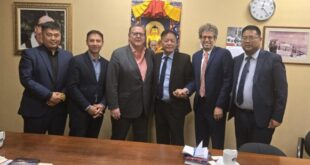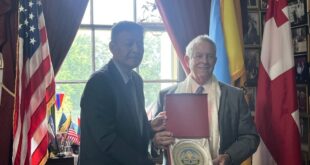
Congressional-Executive Commission on China
www.cecc.gov
CECC Contact: 202-226-3777
October 8, 2015
The CECC Chairs see a disturbing deterioration in human rights and rule of law conditions that pose a direct challenge to U.S. national interests and U.S.-China relations. In the report’s recommendations, the Chairs identify a need for a top-down reformulation of U.S. human rights diplomacy with China.
(WASHINGTON, DC)— Chairman U.S. Representative Chris Smith (R-NJ) and Cochairman U.S. Senator Marco Rubio (R-FL) today issued the 2015 Annual Report of the bipartisan Congressional-Executive Commission on China (CECC). The report provides detailed analysis on 19 human rights and rule of law issue areas and offers specific recommendations on ways to make progress on these issues in the broader U.S.-China relationship. The full report can be accessed on the CECC’s website (www.cecc.gov).
“It has been another punishing year for human rights in China, as this report documents so well. President Xi has presided over an extraordinary assault on the rule of law and civil society using repressive and retrograde policies that threaten freedom advocates in China and challenge both U.S. interests and U.S.-China cooperation and goodwill. U.S. leadership on human rights is needed now more than ever. We must not compromise on the need for fundamental freedoms or shy away from those who seek them. Clearly, our long-term strategic interests depend on the advance of human rights and the rule of law in China,” said Chris Smith, CECC Chair. “This report also details the brutality and human costs of China’s coercive population control policies, a failed social experiment entering its 35th year. The ‘One-Child Policy’ is hated by Chinese families, condemned by the international community, and the potential economic, security, and societal consequences are dire. The United States could play an important role in helping to end this horrific policy—once and for all.”
“As the findings of this report make clear, human rights and rule of law have suffered a devastating blow since President Xi Jinping came to power. By nearly every possible measure, China today is more repressive and more brutal—this is true for the disappeared human rights lawyer, the imprisoned Christian house church pastor, and the silenced Tibetan songwriter,” said CECC Cochair Senator Rubio. “Millions of Chinese people yearn for the same basic rights that we as Americans enjoy, but their aspirations have been met with intimidation, imprisonment, torture, and even death. These realities must not be sidelined in the context of broader U.S.-China relations. There is both a moral and strategic imperative to prioritize advances in human rights and democratic governance. A government that does not respect the rights and basic dignity of its own people cannot be assumed to be a responsible actor in the global arena.”
In a letter to President Obama and Congressional leaders, the Chairs cited the unique bipartisan structure of the CECC, with Commissioners from both parties in Congress and the Administration, and identified 10 areas for more focused legislative and executive action, including, civil society development, human trafficking, press and Internet freedom, ethnic minority rights, Hong Kong, religious freedom, and efforts to reform China’s coercive population control policies.
Both chairs commended the capable, professional, and detailed work of the CECC’s research staff in this important, congressionally mandated undertaking, now in its 14th year.
FULL REPORT (PDF) Download
The text of the letter transmitting the 2015 Annual Report can be found below:
October 8, 2015
The Honorable Barack Obama
The President
The White House
Washington, DC 20050
Dear Mr. President:
The Congressional-Executive Commission on China (“the Commission”) was created by Congress in 2000 to monitor and report on human rights and the development of the rule of law in China and to provide bipartisan recommendations to address these issues within U.S.-China relations. We transmit to you a copy of the 2015 Annual Report, in which the Commission details a marked deterioration overall in human rights and rule of law conditions in China, continuing a disturbing trend since 2013.
The Commission plays a unique role in informing U.S. policy toward China. The Commission’s structure, consisting of a bipartisan group of Senators, House Members, and senior-level Administration officials, is intended to foster cooperation between the legislative and executive branches and promote bipartisan attention to human rights and rule of law within China.
Given the strategic and economic interdependencies of the U.S.-China relationship, and the importance of rights protections for advancing U.S. interests, the report concludes that principled U.S. leadership in advancing human rights and rule of law should remain a cornerstone of U.S. policy toward China and integrated, whenever possible, as a critical component of all U.S. government interactions with the Chinese government, most especially at senior levels.
Based on developments this past year, the report identifies the following areas that we believe Congress and the Administration should focus on in the coming year:
Rule of Law. Despite its claims to the contrary, the Chinese government is not moving toward a rule of law system, but is instead further entrenching a system where the Chinese Communist Party utilizes law to strengthen its own power and crush dissent. Lawyers who accept politically sensitive cases continue to face disbarment, the closure of their law firms, physical violence, intimidation and widespread detention. The government and Party issued a series of far-reaching new security laws during the past year that could provide the basis for an even broader and more severe crackdown on expression and on ethnic minority groups, expanded control of the Internet, and greater restrictions on international businesses that operate in or trade with China. The report recommends that U.S. government officials frequently and publicly raise political prisoner cases and work to ensure that Chinese rights advocates are included in international forums and dialogues. Given the scope of this year’s detentions and disappearances of human rights lawyers and rights defenders (several of whom are featured in the report), and the ongoing use of torture in detention, the report recommends that the Administration consider introducing a resolution on China at the next session of the UN Human Rights Council.
Civil Society. Authorities expanded a crackdown on civil society organizations and further impeded the work of domestic rights-based non-governmental organizations (NGOs), particularly those receiving international funding. A draft Overseas NGO Management Law was issued that has the potential to adversely affect a wide range of charitable, educational, and other organizations that operate inside China. The report recommends continued support for civil society development in China and calls for the creative expansion of funding for NGOs, particularly in areas where China has made some recent commitments, such as projects to promote women’s rights and efforts to curb torture and wrongful convictions. Furthermore, the report recommends that the Administration develop a unified and multi-lateral response to China’s draft NGO law and the suppression of rights-based civil society actors.
Population Control. Authorities continued to use coercive population control methods as well as incentives, including job promotions, for officials who meet birth-limitation targets to implement the one-child-per-couple policy, now in its 35th year. Despite gaining international acclaim for slightly modifying the policy in 2013, the policy overall has fostered official abuse and corruption and exacerbated a sex ratio imbalance biased toward the birth of boys. The report recommends the Administration undertake proactive bilateral and multi-lateral discussions to end all birth limitations and address potential social, humanitarian, and human trafficking problems that result from China’s imbalanced sex ratios. In addition, the report recommends cooperative efforts to implement the provisions of the Girls Count Act (P.L. 114-24) into foreign assistance programs for China.
Religious Freedom. The report notes government campaigns against church buildings and religious symbols were prompted by growing concern over the popularity of Christianity in China. The report also notes harassment of Catholic clergy and Falun Gong practitioners and continued efforts to control the leadership of Tibetan Buddhism and restrict the religious practices of Uyghur Muslims. The report recommends expanded U.S. leadership on international religious freedom, through coordinated multi-lateral efforts and consistent bilateral interactions on the strategic and economic value of promoting this fundamental freedom. The report also recommends that the Administration use existing law to restrict entry visa access to individuals complicit in severe religious freedom violations.
Human Trafficking. China remains a country of origin and destination for the trafficking of men, women, and children, as defined under the UN Protocol to Prevent, Suppress and Punish Trafficking in Persons, Especially Women and Children. Men, women, and children are reportedly trafficked within China’s borders for commercial sex exploitation and forced labor, including in the construction, manufacturing, brick-making, and home care industries. The report recommends that the Administration should use existing laws and policies to prevent goods made with forced labor from entering the United States from China and that federal procurement contracts go only to businesses that can certify that they have inspected their supply chains and made significant efforts to prevent human trafficking. The report also recommends cooperative efforts between the Congress and the Administration to ensure that the U.S. Department of State’s Office to Monitor and Combat Trafficking in Persons has sufficient resources and status to effectively combat modern-day slavery and ensure that its Trafficking in Persons Report’s “Tier Rankings” and country summaries accurately reflect current conditions.
Internet & Press Freedom. Authorities continued to rein in media, opinion-makers, and Internet and social media users critical of government policies by shutting down popular chat site accounts, requiring real-name registration of accounts, and blocking services that allow Internet users to circumvent China’s “Great Firewall.” Foreign journalists continued to report harassment, surveillance, and restrictions on the free flow of news and information. The report recommends greater public expression, including at the highest levels of the U.S. government, on the issue of press and Internet freedom; the expanded distribution of proven technologies to circumvent Internet restrictions in China; and the inclusion of the freedom of cross-border information as part of negotiations for the U.S.-China Bilateral Investment Treaty or future trade negotiations with China.
Commercial Rule of Law. The report notes little progress in China’s compliance with international trading obligations. During this reporting year, there were record trading deficits in China’s favor and U.S. exports to China decreased. U.S. and other foreign businesses faced significant difficulties in the past year due to the weak rule of law, lack of government transparency, and preferential treatment for state-owned enterprises. Foreign businesses faced discriminatory monopoly investigations, intellectual property theft, and draft laws that will require the transfer of technology and encryption keys for information technology firms seeking a share of the Chinese market. The report recommends ensuring that concrete improvements in policies that violate China’s existing international trade obligations are a condition for progress in any U.S. trade-related negotiations with China.
Ethnic Minorities. The report notes deteriorating conditions in ethnic minority areas, from increased violence in the Xinjiang Uyghur Autonomous Region to harsher security measures and efforts to control Tibetan Buddhism in the Tibet Autonomous Region. In addition, as Tibetan self-immolations continued, the Commission observed no sign of Chinese interest in resuming the long-stalled dialogue with the Dalai Lama’s representatives. The report concludes that the Chinese government can best promote stability by respecting ethnic minorities’ right to maintain their language and culture and to practice freely their religion and urges the Administration to address these issues at bilateral security dialogues and any exchanges with Chinese military or police officials. The report also recommends that Congress and the Administration urge the Chinese government to allow the free flow of information regarding incidents of violence in ethnic minority regions; allow journalists and international observers access to those areas in line with international standards; and ensure that U.S. counterterrorism cooperation arrangements do not endorse the Chinese government’s suppression of Chinese citizens.
Hong Kong. The actions of the Chinese and Hong Kong governments during the past year continue to raise concerns about the future of the freedoms, autonomy, and rule of law that distinguish Hong Kong from mainland China and underpin Hong Kong’s financial reputation and prosperity. Given the important economic interests the United States has in Hong Kong, and China’s international commitments to protect a “high degree of autonomy” in Hong Kong, the Commission’s report recommends that the Administration continue to issue annually the report outlined in Section 301 of the United States-Hong Kong Policy Act of 1992. In addition, the report recommends that the Administration and Congress work together to determine whether to reconsider continuing separate treatment for Hong Kong, allowed under the Act, if elections for Hong Kong’s Chief Executive in 2017 are not conducted by universal suffrage according to international standards.
Areas of Potential Progress. The report recommends that Congress and the Administration acknowledge and further inquire with Chinese officials about areas of potential progress noted in the report, including initiatives and legislation that may protect the rights of victims of domestic violence, upgrade environmental protections, and potentially improve some criminal and administrative legal procedures.
The report contains numerous other recommendations, including advocating the use of the Commission’s extensive Political Prisoner Database, with information on over 1,300 currently detained political and religious prisoners. The Commission and its staff stand ready to assist the Administration and the Congress in any way to carry out the report’s recommendations or further explain its findings.
Sincerely,
Christopher Smith Marco Rubio
Chair Cochair




